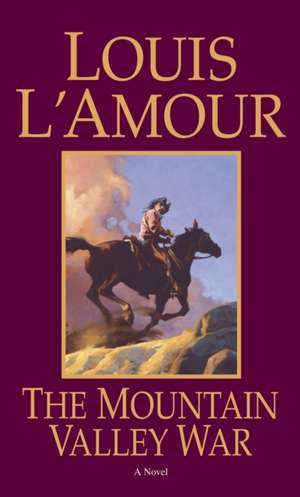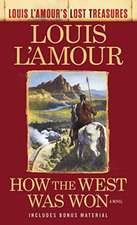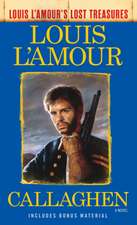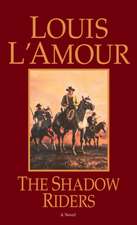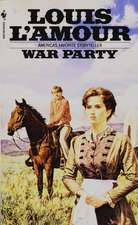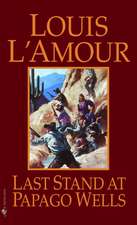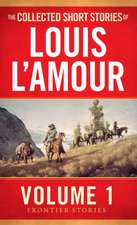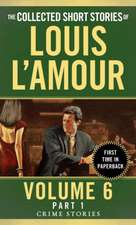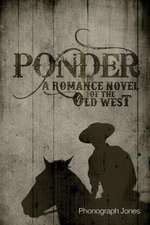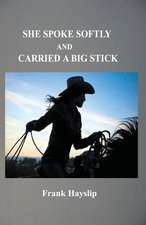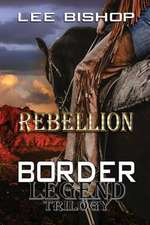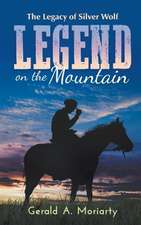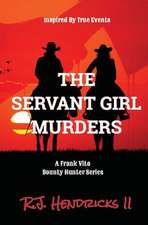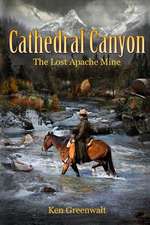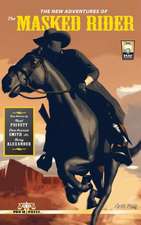The Mountain Valley War: Kilkenny
Autor Louis L'Amouren Limba Engleză Paperback – 31 iul 1997
Preț: 41.75 lei
Preț vechi: 50.30 lei
-17% Nou
Puncte Express: 63
Preț estimativ în valută:
7.99€ • 8.36$ • 6.61£
7.99€ • 8.36$ • 6.61£
Carte disponibilă
Livrare economică 15-22 martie
Livrare express 04-08 martie pentru 23.96 lei
Preluare comenzi: 021 569.72.76
Specificații
Notă biografică
Louis L’Amour is undoubtedly the bestselling frontier novelist of all time. He is the only author in history to receive both the Presidential Medal of Freedom, and the Congressional Gold Medal in honor of his life's work. He has published ninety novels; twenty-seven short-story collections; two works of nonfiction; a memoir, Education of a Wandering Man; and a volume of poetry, Smoke from This Altar. There are more than 300 million copies of his books in print worldwide.
Extras
Chapter One
Smoke lifted from the charred timbers where once the house had stood, and curled wistfully in memory of the great barn Moffit had built to store hay and grain against the coming winters. The corral bars were down and the saddle stock had been run off. Where Dick Moffit's homestead had been that morning there was now only desolation, emptiness, and death.
Dick Moffit lay sprawled on the hard-packed earth of his barnyard, the earth deeply clawed in the agony of death. Even from where he sat on the long-legged buckskin, the man known as Trent could see Moffit had been shot at least six times. Three bullets had gone in from the front, the other three fired directly into his back by a man who stood over him. And Dick Moffit had been unarmed.
The small green valley lay still in the lazy afternoon sun, a faint heat emanating from the burned timbers.
So this was the way a dream ended! Dick Moffit had sold a good business back East to try his luck at stock-raising in the far West, something for which he had longed since boyhood.
The man who called himself Trent walked his horse slowly around the burned-out farm. Four or five men had come here, one of them riding a horse with a split right-rear hoof. They had shot Moffit down, then burned his layout.
Yet, where were his children? What about Sally Crane, who was sixteen? And young Jack Moffit, who was but fourteen? There was no evidence of them here, and although the killers might have taken Sally away, they would undoubtedly have killed Jack.
There were no other bodies, nor were there any recent tracks of the children. Those that remained and could be distinguished at all were several days old.
Thoughtfully Trent turned away. The buckskin knew the way they turned was toward home and quickened his pace. There were five miles to go, five miles of rugged trails through mountains and heavy timber and with no clear trail. For this was the way of the man called Trent, that he leave no definite trail wherever he went, and each time he came or went from his mountain hideaway he used a different route, so far as was possible.
He did not expect to be trailed by anyone at this time, but then, many a good man was now dead who had not expected to be followed.
This could be it. Always, of course, he had known the day would come, for trouble had a way of seeking him out, try as he would to avoid it. For too many months now everything had gone too well. The rains had come when needed, the grass had grown tall, his few cattle were growing fat. When in town, he had completed his business and bought his supplies then returned home. Of course, there had been rumors that King Bill Hale climbed the high meadows, and there was surprise that he had not moved to drive them out.
Slightly more than a year ago he had moved into this high green valley and built his cabin. He found no cattle ranging there, nor signs of them, nor were there sheep. It was a high, lonely place, and the places the others had chosen were much the same, although lower down than his own place. No drifting cowpunchers came this high, and only rarely a lion or bear hunter. His only neighbors were other nesters like himself--Moffit, the Hatfields, O'Hara, Smithers, and a scattering of others.
In the vicinity of Cedar Bluff there was but one ranch. One, and only one. On that ranch and in the town, one man ruled supreme. He rode with majesty, and when he walked, he strode with the step of kings. He never went out unattended, and he permitted no man to address him unless he chose to speak first. He issued orders and bestowed favors like an eastern potentate, and if there were those who chose to dispute his authority, he crushed them without hesitation. With some the pressure of his disfavor was enough. With others he simply offered them a price and their choice was simple: sell out or be forced out.
King Bill Hale had come west as a boy, and even then he was possessed of capital. In Texas he bought cattle, hired the best available men, and drove his herd to Kansas, where he sold at a handsome profit. He learned to fight and to use a gun, and that often a man had to fight to hold what was his. He learned to drive a bargain that was tight and cruel, and to despise weakness. He saw the strong survive and the weak fail, and he determined then to be not only strong but strongest.
He had come to Cedar Bluff, which was on the ragged edge of nowhere, and he drove off those who peddled whiskey to the Indians and the cattle rustlers who used it as a hideout. He drove off the few Indians in the area, and when one honest rancher refused to sell, Hale promptly reduced his offer to half, then bought the one supply store and refused credit. When that was not sufficient, he refused to do business with the rancher under any conditions.
Cedar Bluff and Cedar Valley lived under the eye of King Bill Hale, a strong man and an able one. His ranch prospered, his trading post did well, and he built the Cedar Hotel, a gambling house and saloon he called the Mecca, and then he started a stage line.
He owned sixty thousand acres of good grazing land, which he had bought for prices ranging from a few cents to a dollar an acre. He controlled, by virtue of holding all accessible water, at least a hundred thousand more acres.
He had, aside from enough inherited money to begin at the top, almost unbelievable luck. Of the three trail drives he made to Kansas, not one stampeded, the weather was always good, and the Indians far away. King Bill Hale, however, did not believe in good fortune and was sure he possessed some inherent quality that accounted for his success.
He had been astute, but so had others. He had come along at a time when the cattle business was booming and even some stupid men were making money as a result. He bought beef cattle in Texas for three or four dollars a head and sold them in Kansas for twenty-eight to thirty-five dollars.
In a chancy business where stampedes could scatter cattle all over the range, and where lack of good grazing and water could turn them to little more than hide and hair, he had experienced only success. Now that he was surrounded by those whose success depended upon him, he was free with his money and favors granted, and harsh to all who were not subservient.
He thought of himself as a good man and would have been shocked at the implication of anything otherwise. Those not as successful as himself were "saddle tramps," "nesters," or those who worked for him, who were tolerated if not praised.
Whenever he rode out, he had tough, hard-scaled Pete Shaw, an excellent cattleman who rode for the brand, and his son, "Cub" Hale.
Behind them trailed the so-called Gold Dust Twins, Dunn and Ravitz, gunmen.
The man who called himself Trent rarely visited Cedar Bluff. The supplies he required were few, the two packhorses more than adequate to carry all he needed for three or four months, and he knew that sooner or later there would be someone from the outside who would say, "That's Kilkenny!"
Men would turn to look, for the stories of the strange, drifting gunfighter were many, although few men lived who could describe him or knew the way he lived. He had no desire for notoriety, no need to be known as a gunfighter, and that he had become so was through no choice of his own but rather a simple combination of traits such as a natural skill with weapons, a cool head and steady hand, as well as remarkable coordination and the experience of years in judging both men and situations.
Mysterious, solitary, and shadowy, he had literally been everywhere. He drifted in and out of cow camps and mining towns, usually unknown, and often a subject of discussion around campfires where he was himself present. Occasionally the moment would come when for one reason or another he must draw a gun, and then for one brief and bloody moment Kilkenny stood revealed for who he was and what he was.
His activities had been many and varied, but no more so than those of many another man of his time and situation, for most men did what was necessary at the time and most were skilled at a variety of trades. He had been a trapper and a buffalo hunter, an officer in the Union Army during the Civil War, a stage driver, a shotgun guard on stages, a cowhand, foreman on a cattle ranch, a tie cutter, a track layer, and a variety of other things. Once involved in a shooting, he never remained in the area, but was gone within the hour if his presence was not demanded at an inquest, and such affairs were few.
In Cedar Bluff he used the name of Trent, and in the high peaks he had found the lush green valley where he built a cabin, ran a few head of cattle driven in from Oregon, and broke wild horses that roamed the utterly wild country to the westward. It was a lonely place, so when he arrived he hung his gun belts on a peg in the cabin and from that time on carried only his rifle.
When in Cedar Bluff, he went only to the general store and occasionally to a small boardinghouse where meals were served, avoiding the Mecca. Most of all he avoided the Crystal Palace, the new gambling house and saloon owned by Nita Riordan.
The cabin in the pines was touched with the red glow of a setting sun when he stepped down from the buckskin and slapped the horse cheerfully on the shoulder.
"Home again, Buck! Feels good, doesn't it?"
He stripped the gear from the horse and turned him into the corral, then carried saddle and bridle into the log barn. He forked hay to the horse, and the marmot in the pile of rocks near the entrance to the trail chewed on some tidbit and paid him no attention. After the first few weeks the marmot had ceased to whistle his warning when Trent approached, no longer considering him a potential danger but rather as part of the normal activity on the mountain. Occasionally Trent placed bits of bread or fruit on the rocks and the marmot ate them, obviously accepting them as tribute from this more or less silent invader.
It was a lonely life with which Trent was content, although from time to time he found himself thinking of the girl in Cedar Bluff.
Did she know he was here? Remembering her from the Live Oak country of Texas where they had first met, he decided that she did, for Nita Riordan had her own ways of knowing all that went on. He did not allow himself to think that she had come here because of him, yet it could scarcely be coincidence that she would arrive in this rather lonely part of the country shortly after his own arrival.
She knew how he felt.
As he went about the business of preparing a meal, he thought of Parson Hatfield and his tall sons. What would the old mountaineer do now? Moffit had been their very good friend, and each had helped the other build when they first filed on land in the mountains. They were hard-working people, intensely loyal to each other and to their friends. Above all, they had a very strong sense of what was right and wrong. If King Bill Hale tried to drive them out, they would fight.
They were the type. They were men who had always worked with their hands, and were beholden to no man. Not one of them was a gunfighter, but each had used a rifle or a short gun all his life and would have been lost without one or the other.
Big Dan O'Hara was another one. A big, bluff Irishman who had been a track worker, a policeman, and a railroad man back east, always acting as though campaigning for public office. He would fight, of course. No one knowing Dan could believe otherwise.
Hale had shown no interest in the high country until the settlers had moved in. Once it was occupied, it immediately seemed to become valuable to him, or at least to Cub Hale. The fact was that in this country, cut off as it was from other settlements, King Bill wished to be ruler of all that lay about him.
Without doubt war was coming to the high peaks, and the man called Trent thought bitterly of all that would entail. He could not walk out and leave all he had here, any more than he could abandon his friends in their hour of need. Like himself, the others had come to build homes. One and all they meant to remain where they were, each knowing he was unlikely to find anything so lovely again, or with so many possibilities.
There were other things that must be kept in mind. The last time he had visited Cedar Bluff there had been a letter for him from Ranger Lee Hall.
We're getting along all right here, but I thought you should know: Cain Brockman is out and swears he will hunt you down and kill you for killing his brother and whipping him with your fists. And you can be sure he'll try. Be careful.
He dropped four slices of bacon into the pan, humming softly to himself. Then he put on some coffee water and sliced a couple of pieces of bread. He was putting the bacon on a tin plate when he heard a muffled sound from the bedroom.
Instantly he was still. A blanket hung over the door into the bedroom, and his guns hung on a peg across the room. His rifle was nearer.
He went about the business of preparing his meal until close to the rifle, then dropped his hand to it and brought it hip-high. Holding the rifle in his right hand, ready to fire pistol-fashion, he stepped over and jerked back the blanket.
Two youngsters sat on the edge of his bed, a wide-eyed girl of about sixteen and a freckled-faced boy at least two years younger. They stared at him, frightened and pale.
He lowered the muzzle of the gun toward the floor. "How in blazes did you youngsters get here?"
Smoke lifted from the charred timbers where once the house had stood, and curled wistfully in memory of the great barn Moffit had built to store hay and grain against the coming winters. The corral bars were down and the saddle stock had been run off. Where Dick Moffit's homestead had been that morning there was now only desolation, emptiness, and death.
Dick Moffit lay sprawled on the hard-packed earth of his barnyard, the earth deeply clawed in the agony of death. Even from where he sat on the long-legged buckskin, the man known as Trent could see Moffit had been shot at least six times. Three bullets had gone in from the front, the other three fired directly into his back by a man who stood over him. And Dick Moffit had been unarmed.
The small green valley lay still in the lazy afternoon sun, a faint heat emanating from the burned timbers.
So this was the way a dream ended! Dick Moffit had sold a good business back East to try his luck at stock-raising in the far West, something for which he had longed since boyhood.
The man who called himself Trent walked his horse slowly around the burned-out farm. Four or five men had come here, one of them riding a horse with a split right-rear hoof. They had shot Moffit down, then burned his layout.
Yet, where were his children? What about Sally Crane, who was sixteen? And young Jack Moffit, who was but fourteen? There was no evidence of them here, and although the killers might have taken Sally away, they would undoubtedly have killed Jack.
There were no other bodies, nor were there any recent tracks of the children. Those that remained and could be distinguished at all were several days old.
Thoughtfully Trent turned away. The buckskin knew the way they turned was toward home and quickened his pace. There were five miles to go, five miles of rugged trails through mountains and heavy timber and with no clear trail. For this was the way of the man called Trent, that he leave no definite trail wherever he went, and each time he came or went from his mountain hideaway he used a different route, so far as was possible.
He did not expect to be trailed by anyone at this time, but then, many a good man was now dead who had not expected to be followed.
This could be it. Always, of course, he had known the day would come, for trouble had a way of seeking him out, try as he would to avoid it. For too many months now everything had gone too well. The rains had come when needed, the grass had grown tall, his few cattle were growing fat. When in town, he had completed his business and bought his supplies then returned home. Of course, there had been rumors that King Bill Hale climbed the high meadows, and there was surprise that he had not moved to drive them out.
Slightly more than a year ago he had moved into this high green valley and built his cabin. He found no cattle ranging there, nor signs of them, nor were there sheep. It was a high, lonely place, and the places the others had chosen were much the same, although lower down than his own place. No drifting cowpunchers came this high, and only rarely a lion or bear hunter. His only neighbors were other nesters like himself--Moffit, the Hatfields, O'Hara, Smithers, and a scattering of others.
In the vicinity of Cedar Bluff there was but one ranch. One, and only one. On that ranch and in the town, one man ruled supreme. He rode with majesty, and when he walked, he strode with the step of kings. He never went out unattended, and he permitted no man to address him unless he chose to speak first. He issued orders and bestowed favors like an eastern potentate, and if there were those who chose to dispute his authority, he crushed them without hesitation. With some the pressure of his disfavor was enough. With others he simply offered them a price and their choice was simple: sell out or be forced out.
King Bill Hale had come west as a boy, and even then he was possessed of capital. In Texas he bought cattle, hired the best available men, and drove his herd to Kansas, where he sold at a handsome profit. He learned to fight and to use a gun, and that often a man had to fight to hold what was his. He learned to drive a bargain that was tight and cruel, and to despise weakness. He saw the strong survive and the weak fail, and he determined then to be not only strong but strongest.
He had come to Cedar Bluff, which was on the ragged edge of nowhere, and he drove off those who peddled whiskey to the Indians and the cattle rustlers who used it as a hideout. He drove off the few Indians in the area, and when one honest rancher refused to sell, Hale promptly reduced his offer to half, then bought the one supply store and refused credit. When that was not sufficient, he refused to do business with the rancher under any conditions.
Cedar Bluff and Cedar Valley lived under the eye of King Bill Hale, a strong man and an able one. His ranch prospered, his trading post did well, and he built the Cedar Hotel, a gambling house and saloon he called the Mecca, and then he started a stage line.
He owned sixty thousand acres of good grazing land, which he had bought for prices ranging from a few cents to a dollar an acre. He controlled, by virtue of holding all accessible water, at least a hundred thousand more acres.
He had, aside from enough inherited money to begin at the top, almost unbelievable luck. Of the three trail drives he made to Kansas, not one stampeded, the weather was always good, and the Indians far away. King Bill Hale, however, did not believe in good fortune and was sure he possessed some inherent quality that accounted for his success.
He had been astute, but so had others. He had come along at a time when the cattle business was booming and even some stupid men were making money as a result. He bought beef cattle in Texas for three or four dollars a head and sold them in Kansas for twenty-eight to thirty-five dollars.
In a chancy business where stampedes could scatter cattle all over the range, and where lack of good grazing and water could turn them to little more than hide and hair, he had experienced only success. Now that he was surrounded by those whose success depended upon him, he was free with his money and favors granted, and harsh to all who were not subservient.
He thought of himself as a good man and would have been shocked at the implication of anything otherwise. Those not as successful as himself were "saddle tramps," "nesters," or those who worked for him, who were tolerated if not praised.
Whenever he rode out, he had tough, hard-scaled Pete Shaw, an excellent cattleman who rode for the brand, and his son, "Cub" Hale.
Behind them trailed the so-called Gold Dust Twins, Dunn and Ravitz, gunmen.
The man who called himself Trent rarely visited Cedar Bluff. The supplies he required were few, the two packhorses more than adequate to carry all he needed for three or four months, and he knew that sooner or later there would be someone from the outside who would say, "That's Kilkenny!"
Men would turn to look, for the stories of the strange, drifting gunfighter were many, although few men lived who could describe him or knew the way he lived. He had no desire for notoriety, no need to be known as a gunfighter, and that he had become so was through no choice of his own but rather a simple combination of traits such as a natural skill with weapons, a cool head and steady hand, as well as remarkable coordination and the experience of years in judging both men and situations.
Mysterious, solitary, and shadowy, he had literally been everywhere. He drifted in and out of cow camps and mining towns, usually unknown, and often a subject of discussion around campfires where he was himself present. Occasionally the moment would come when for one reason or another he must draw a gun, and then for one brief and bloody moment Kilkenny stood revealed for who he was and what he was.
His activities had been many and varied, but no more so than those of many another man of his time and situation, for most men did what was necessary at the time and most were skilled at a variety of trades. He had been a trapper and a buffalo hunter, an officer in the Union Army during the Civil War, a stage driver, a shotgun guard on stages, a cowhand, foreman on a cattle ranch, a tie cutter, a track layer, and a variety of other things. Once involved in a shooting, he never remained in the area, but was gone within the hour if his presence was not demanded at an inquest, and such affairs were few.
In Cedar Bluff he used the name of Trent, and in the high peaks he had found the lush green valley where he built a cabin, ran a few head of cattle driven in from Oregon, and broke wild horses that roamed the utterly wild country to the westward. It was a lonely place, so when he arrived he hung his gun belts on a peg in the cabin and from that time on carried only his rifle.
When in Cedar Bluff, he went only to the general store and occasionally to a small boardinghouse where meals were served, avoiding the Mecca. Most of all he avoided the Crystal Palace, the new gambling house and saloon owned by Nita Riordan.
The cabin in the pines was touched with the red glow of a setting sun when he stepped down from the buckskin and slapped the horse cheerfully on the shoulder.
"Home again, Buck! Feels good, doesn't it?"
He stripped the gear from the horse and turned him into the corral, then carried saddle and bridle into the log barn. He forked hay to the horse, and the marmot in the pile of rocks near the entrance to the trail chewed on some tidbit and paid him no attention. After the first few weeks the marmot had ceased to whistle his warning when Trent approached, no longer considering him a potential danger but rather as part of the normal activity on the mountain. Occasionally Trent placed bits of bread or fruit on the rocks and the marmot ate them, obviously accepting them as tribute from this more or less silent invader.
It was a lonely life with which Trent was content, although from time to time he found himself thinking of the girl in Cedar Bluff.
Did she know he was here? Remembering her from the Live Oak country of Texas where they had first met, he decided that she did, for Nita Riordan had her own ways of knowing all that went on. He did not allow himself to think that she had come here because of him, yet it could scarcely be coincidence that she would arrive in this rather lonely part of the country shortly after his own arrival.
She knew how he felt.
As he went about the business of preparing a meal, he thought of Parson Hatfield and his tall sons. What would the old mountaineer do now? Moffit had been their very good friend, and each had helped the other build when they first filed on land in the mountains. They were hard-working people, intensely loyal to each other and to their friends. Above all, they had a very strong sense of what was right and wrong. If King Bill Hale tried to drive them out, they would fight.
They were the type. They were men who had always worked with their hands, and were beholden to no man. Not one of them was a gunfighter, but each had used a rifle or a short gun all his life and would have been lost without one or the other.
Big Dan O'Hara was another one. A big, bluff Irishman who had been a track worker, a policeman, and a railroad man back east, always acting as though campaigning for public office. He would fight, of course. No one knowing Dan could believe otherwise.
Hale had shown no interest in the high country until the settlers had moved in. Once it was occupied, it immediately seemed to become valuable to him, or at least to Cub Hale. The fact was that in this country, cut off as it was from other settlements, King Bill wished to be ruler of all that lay about him.
Without doubt war was coming to the high peaks, and the man called Trent thought bitterly of all that would entail. He could not walk out and leave all he had here, any more than he could abandon his friends in their hour of need. Like himself, the others had come to build homes. One and all they meant to remain where they were, each knowing he was unlikely to find anything so lovely again, or with so many possibilities.
There were other things that must be kept in mind. The last time he had visited Cedar Bluff there had been a letter for him from Ranger Lee Hall.
We're getting along all right here, but I thought you should know: Cain Brockman is out and swears he will hunt you down and kill you for killing his brother and whipping him with your fists. And you can be sure he'll try. Be careful.
He dropped four slices of bacon into the pan, humming softly to himself. Then he put on some coffee water and sliced a couple of pieces of bread. He was putting the bacon on a tin plate when he heard a muffled sound from the bedroom.
Instantly he was still. A blanket hung over the door into the bedroom, and his guns hung on a peg across the room. His rifle was nearer.
He went about the business of preparing his meal until close to the rifle, then dropped his hand to it and brought it hip-high. Holding the rifle in his right hand, ready to fire pistol-fashion, he stepped over and jerked back the blanket.
Two youngsters sat on the edge of his bed, a wide-eyed girl of about sixteen and a freckled-faced boy at least two years younger. They stared at him, frightened and pale.
He lowered the muzzle of the gun toward the floor. "How in blazes did you youngsters get here?"
